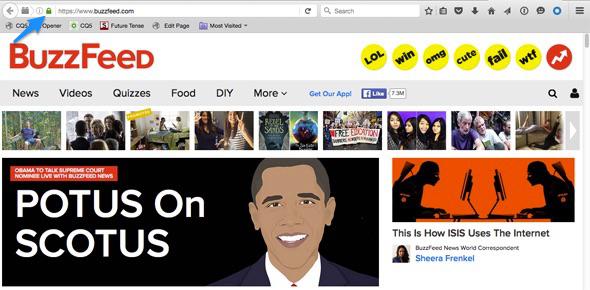You may associate BuzzFeed with cats and ’90s listicles, but on Monday the company announced something a bit more serious. The site has transitioned to using HTTPS encryption by default on all its pages, meaning your browser’s server requests and the data BuzzFeed sends back are all protected.
As cybersecurity has become a bigger priority to companies and organizations around the world, more of the sites and services we use every day have moved from using the foundational Web protocol HTTP to the more secure HTTPS. Google expanded its use of HTTPS for Gmail in 2014, and the White House Office of Management and Budget announced an HTTPS-Only Standard directive last year that requires all public-facing federal sites to use the protocol. Media companies have lagged behind on the transition, though.
In a blog post on Monday, BuzzFeed noted that this is partly because of unencrypted third-party advertising content. A page can only use HTTPS if all its embedded components use it, too, and BuzzFeed has an unusual amount of control over its ads because it produces them in-house. The Washington Post began transitioning its site to use HTTPS in June, but many other media outlets like the New York Times, the Gawker blog network, and Slate haven’t made the switch. “It was still a significant challenge for our engineering team to ensure that all of our embedded content (tweets, nstagrams, YouTube videos, etc.) is served over HTTPS,” wrote BuzzFeed’s Director of Global Security Jason Reich, Director of Engineering Clement Huyghebaert, and Assistant General Counsel Nabiha Syed. “Fortunately most of the major platforms we embed are already doing it.”
To incentivize the transition, Google said in 2014 that its search results would start giving preference to encrypted pages and would ramp up this weighting more and more. BuzzFeed acknowledges this, and given that the company that is so focused on virality and social promotion, it’s not surprising that the site would want to take advantage of the extra boost—HTTPS is a win-win for BuzzFeed.
Encryption helps to protect readers from surveillance or attack, creates a safer space for discourse, and could boost search engine optimization. BuzzFeed’s blog post notes that HTTPS doesn’t solve everything but adds that it is “one part of a long process towards helping protect users’ data and information from those who want to exploit it.” Hopefully, other media outlets will see all of this and get in on the encryption action.
